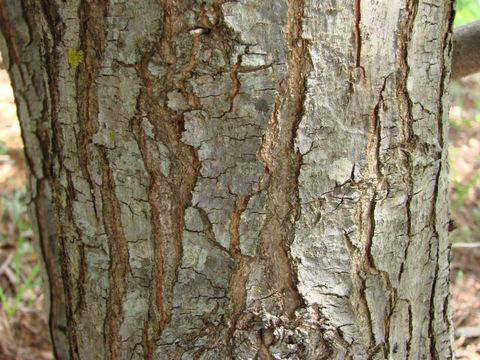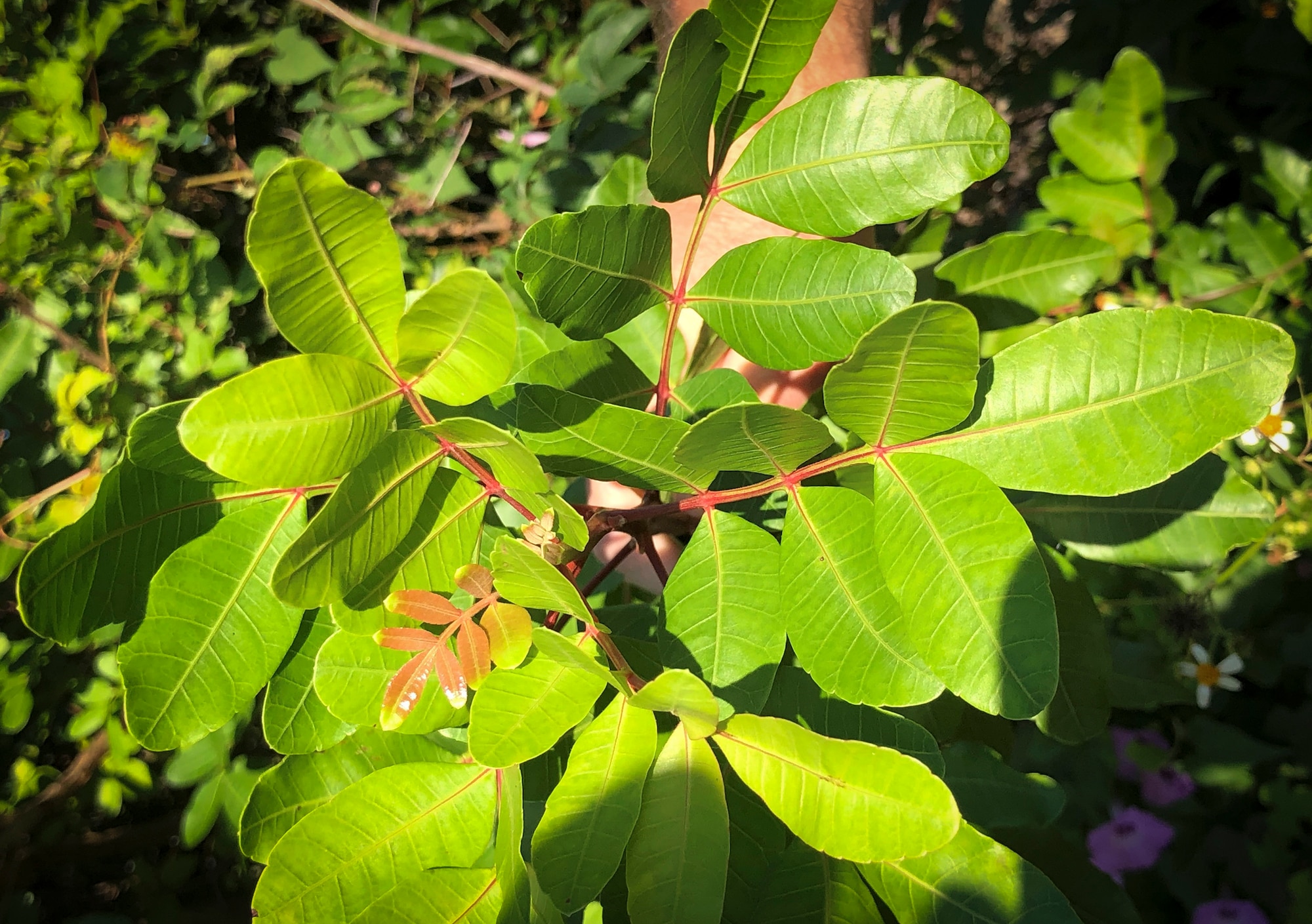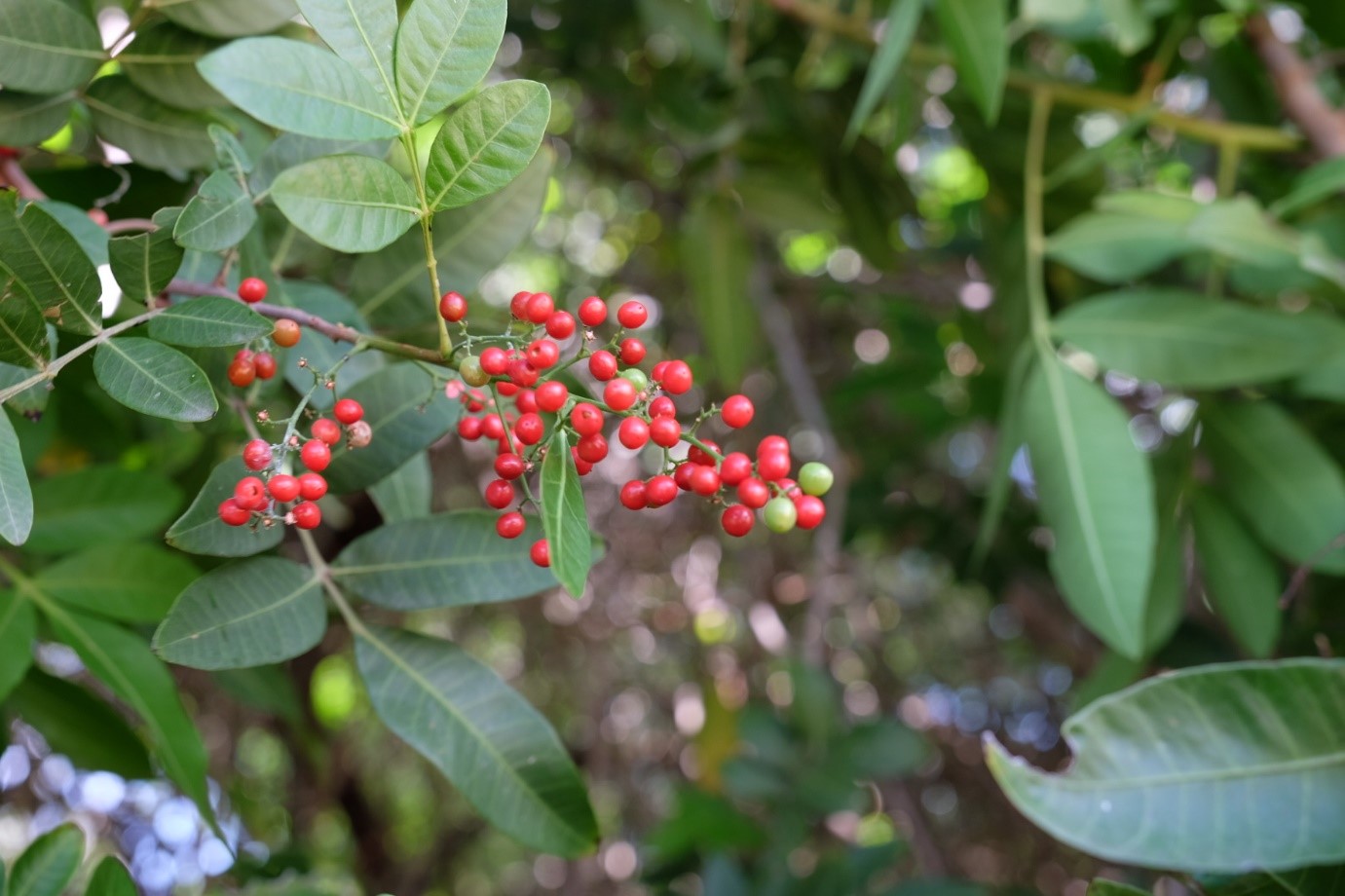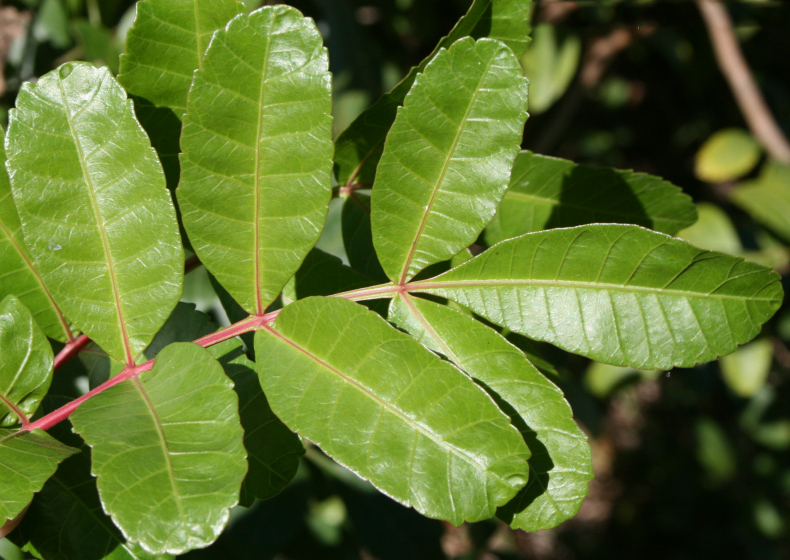brazilian pepper tree rash
The rash commonly develops blisters. The sap and crushed berries possess a variety of sensitizing phenols.

Brazilian Peppertree Schinus Terebinthifolia มะต มแขก Madtuum Khaaek Thaifoodmaster
Back to Frequently Asked Questions.

. Beware the Stinging Hairs. Is Brazilian peppertree harmful to people. Each plant has both.
Up to 25 cash back Hello The rash from brazilian pepper does occur due to substance of the category known urshiolThe corticosteroids used for treatment for this rash in less then the doses of 2 are useless more temporary relief. The insects known as thrips were reared as part of a joint partnership between the South Florida Water Management District SFWMD the US. Touching the Brazilian pepper often results in skin irritation and blistering itchy rashes.
The Brazilian pepper tree is a highly aggressive prolific and hardy shrub. Brazilian pepper shrubs are an invasive evergreen from South America. You may notice a rash develop in as little as eight to Read More.
The species was brought into Florida in mid-1800 for use as an ornamental plant. This most hated plant can invade aquatic as well as terrestrial environments making it doubly dangerous. Once called Florida holly for its bright red berries Brazilian pepper branches were often used as Christmas decorations in Florida.
It is in the same plant family as poison ivy and poison oak and can cause severe skin irritation and breathing problems in some people. Airborne bloom emissions can cause sinus and nasal congestion chest pains sneezing headaches and eye irritation to. Brazilian pepper-tree is native to Argentina Paraguay and Brazil.
Also known as Canada nettle the low-standing wood nettle grows in open woods with moist soils along streams and in drainages. Just trimming Brazilian pepper especially when in bloom can cause these. Physical contact with sap can cause severe skin irritation in the form of rash and itching.
Its against the law to sell or. Some people are quite allergic to BP. Native to central South America the Brazilian pepper tree was originally introduced to Florida as an ornamental plant in the mid-1800s for its attractive foliage and clusters of small.
While it is illegal to cultivate it in many areas such as Florida birds propagate it by spreading the seeds. Brazilian Pepper is in the same family of plants as Poison Ivy Poison Oak and Poison Sumac and thus can cause extreme skin irritation and cannoot be burned. This spreading of the rash occurs when the plants oils spread around to new areas.
Exposure to the inner bark of freshly cut Brazilian pepper trees can result in a skin rash. Its species name is Schinus terebinthifolius. Several local and federal agencies today took another step in protecting Americas Everglades by releasing an insect reared to combat the invasive Brazilian peppertree.
N this does lead to other reactions to bodyYou may do following to have relief-1Just wait watchIt is the time which is the best. South Florida Water Management District. Wood nettle is an herbaceous plant typically.
The flowers and fruits can cause respiratory irritation. Bark is gray smooth or becoming furrowed into long narrow flat ridges. Afterwards the red raised rash is noticed.
It sends up root suckers and new shoots when it is cut. New areas of rash often continue to develop for 7 days. The sap is aromatic and resinous.
Imported from South America in the 1840s Brazilian peppertree quickly spread into natural areas taking over native tree hammocks pine flatlands and mangrove forest communities. The folk medicine uses of pepper tree are many and include relief from symptoms of ulcers respiratory concerns diarrhea and skin concerns. Both trees provide dense shade with California pepper tree growing 25 to 40 feet tall in U.
Like poison ivy Brazilian pepper is a member of the Anacardiaceae family. The family Anacardiaceae contains poison ivy poison oak poison sumac and Schinus terebinthifolia or Brazilian peppertree. Leaves are alternate pinnate with narrowly winged green finely hairy axis.
Leaflets often have inconspicuous small blunt teeth toward tips are. Brazilian pepper-tree is an evergreen shrub or small tree 3-10 m tall occasionally 15 m. Several studies have confirmed Brazilian pepper tree to be toxic against Staphylococcus.
Dogwood tree Leaves of Three Let It Be. The Brazilian pepper tree Schinus terebinthifolius or Florida holly may be the most common cause of allergic contact dermatitis in southern Florida. It comes from the family of flowering plants known as Anacardiaceae also called the cashew or sumac family.
21 September 2017. The fluid from these blisters cannot spread the rash. Contact with most parts of Brazilian pepper can cause an itchy skin rash and sometimes inflammation and swelling of the face and eyes.
Though its name is similar to that of the black pepper plant the tree doesnt contain actual pepper. This subtropical plant species is a relative of poison ivy. Eating the seeds can result in death for humans and dogs.
People sensitive to poison ivy oak or sumac may also be allergic to Brazilian peppertree because it also has the potential to cause dermatitis to those with sensitive skin. Every part of the poison sumac plant can cause a rash if you come in contact with it. Wear gloves long-sleeve shirts long pants and eye protection when cutting Brazilian pepper trees.
1 However most contemporary uses of Brazilian pepper tree are focused on its activity against harmful organisms. Department of Agriculture plant hardiness zones 8 through 11 and Brazilian pepper tree growing 15 to. Brazilian pepper red berries and leaves can cause vomiting and the sap can cause a rash in sensitive people.
The Brazilian pepper tree is also known as the Florida Holly or the Christmasberry tree. It often grows into small clumps.
Brazilian Pepper Tree On Most Hated Plants List
Our National Parks Eradication Of Brazilian Pepper Not Simple

Avoid The Brazilian Pepper Tree Schinus Terebinthifolius An Invasive Species Gardening Channel

Brazilian Pepper Tree Facts And Health Benefits

Brazilian Pepper Tree Facts And Health Benefits

Pinellas County Extension Timely Topics Toxic Plants

Brazilian Pepper Everglades Cisma

Brazilian Pepper Tree Mlalazi Estuarine Floodplain Inaturalist

Brazilian Pepper Tree Mlalazi Estuarine Floodplain Inaturalist

Superbugs Meet Your Worst Nightmare This Pepper Tree

Brazilian Pepper Tree Mlalazi Estuarine Floodplain Inaturalist

Brazilian Peppertree Invading Eglin Ecosystem Eglin Air Force Base Article Display

Schinus Terebinthifolius Alchetron The Free Social Encyclopedia
5 Natural Remedies For Poison Ivy Rashes Allegheny Kiski

Broad Leaved Pepper Tree Biocontrol Of Priority Environmental Weeds In Nsw

Aci Land Aquatic Management Brazilian Pepper Tree Removal

Dangerous Brazilian Red Pepper Trees Spoonbill Courier

Best Herbicide Products For Getting Rid Of Brazilian Pepper Tree Solutions Pest Lawn
